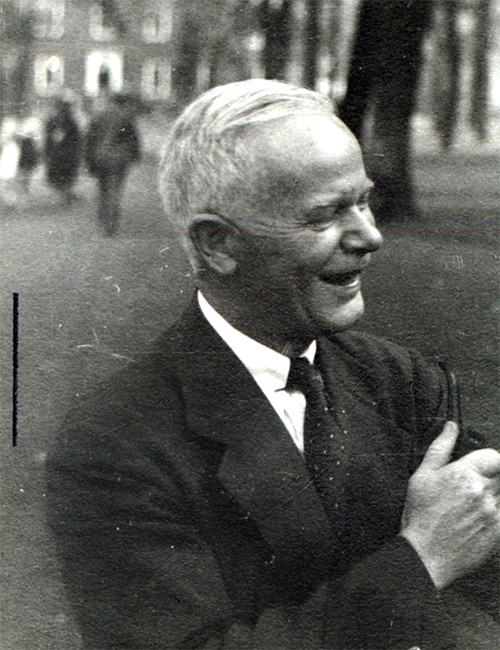Making the “Pat on the Back” Permanent at Bowdoin
Paul Nixon served as dean of students from 1918 to 1947, and his colorful diaries tell stories of the very real needs felt by many of his charges—interview attire, winter coats, emergency travel funds.
His generosity and problem-solving inspired the Dean Paul Nixon Discretionary Fund—a seed that has grown into our formal push for endowed comprehensive aid.

As Dean of the College Nathaniel Cooper Kendrick said at Paul Nixon’s memorial service in 1956: “His friendship comprehended scores of faculty members and the thousands of Bowdoin students who entered and became part of the College during four decades… In each he had a personal interest, no less sincere because he felt it for so many.”
The Dean Paul Nixon Discretionary Fund, which “is open to gifts and contributions from any source,” was established in 1981 by E. Jeffrey Gilman of the Class of 1940, and his wife, Barbara Drummond Gilman.
It is “to be awarded whenever the dean of the College feels that a student deserves a ‘pat on the back’—not necessarily for a great action but for any of those moments which call for a ‘pat on the back.’”
A dive into the archives shows some examples of what Nixon meant by a “pat on the back,” and how acts of generosity are self-perpetuating, as Bowdoin graduates who benefited from them often chose to “pay it forward” with donations of their own, once they had the means.
In a September 1937 diary entry from the annual President’s Report, Nixon describes how one alumnus provided “a custom-made suit and overcoat (hardly worn)… to be given to some student in need of clothes. Easy to find,” comments Nixon, who goes on to say how the same man sent him $250 the previous year “to be given anonymously to a Senior or two, who otherwise didn’t see how to meet bills at end of year. This donor had that experience himself, got such a gift, and keeps passing it on.”

Later that year, Nixon wrote about another alumnus, one who offered $500 a year to help a student who had just graduated but didn’t have the finances to attend medical school. Another graduate contacted Nixon, he wrote, to say “his ‘gratitude’ is troubling him…couldn’t I arrange to have him give an anonymous $100 to some very needy and deserving student? Easy.” As for the student beneficiary of the $100 gift: “Did his face shine when I told him...”
Today, Bowdoin depends on several funds to meet these needs, which, left unmet, can cause a promising student to slip through the cracks. Family emergencies, dental emergencies, passport fees—these costs are outside of the tuition and board expenses covered by traditional financial aid, and they can keep students on aid from having a full Bowdoin experience.
Dean Nixon was well aware of the difference that a “pat on the back” can make to a student who might not know to ask for it. He might scoff to think that these small, thoughtful gestures made him “ahead of his time,” but they have multiplied, compounded, and strengthened this community for generations.
By endowing $35 million for comprehensive aid, Bowdoin will be better prepared to meet the changing needs of our students, regardless of what they may face. As Dean Nixon might say: easy.
The From Here campaign is committed to raising $200 million for traditional financial aid, and $35 million for comprehensive aid.